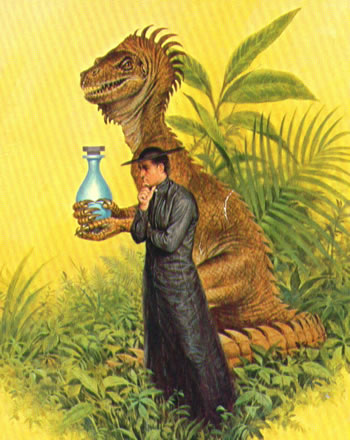- Crux sancta sit mihi lux / Non draco sit mihi dux
- Vade retro satana / Numquam suade mihi vana
- Sunt mala quae libas / Ipse venena bibas
- "Let the Holy Cross be my light / Let not the dragon be my guide
- Step back Satan / Never tempt me with vain things
- What you offer me is evil / You drink the poison yourself."
- I've recently been reading A Case of Conscience by James Blish. It’s supposed to be the first science-fiction books to deal with religion. I don't really think that's true but who am I to disagree with the people who update Wikipedia. I'm only half way but for some reason I don't feel like that should stop me from talking about it. A Case of Conscience is about Father Ruiz-Sanchez, a Jesuit priest who is also a biologist. This is less surprising since science fiction has taught us that Jesuits are the only Christians to make it to space. I also have this problem that I always picture Jesuits as looking like Jeremy Irons, which becomes confusing if there is more than one of them.

Jeremy Irons in The Mission The main plot has to do with the unique inhabitants of the planet Lithia. Lithians are born in the sea and spend the beginning of their life as a fish. After a while they move to the shallows near the shore where they lose their tails and grow legs. At this point they move on to the shore and spend time in that area where they begin to lose all of their traits that made them survive in the sea, and then eventually become a jungle dwelling creature. Once they have lived and survived in every single type of habitat Lithia has to offer they then gain sentience and higher reasoning. So in one life time a Lithian goes through an entire evolutionary cycle even including the sudden addition of what appears to be a soul. Lithia is a paradise. The Lithians live in perfect harmony with their world and with each other. They have no greed, no jealousy, no anger, no murder, no rape, or any other such un-pleasantries. They live in a society that seems to be a perfect representation of Christian morality in an unfallen world. The problem with this is that the Lithians are also completely scientific and logical and atheistic. They have no concept of God and seemingly no ability to have any sort of religious faith.
Both these things together form a sort of trap for Christians. Here we have an alien race that single handedly disproves a lot of the things that Christians attest to. Ruiz-Sanchez himself describes the problems the planet presents;
Ruiz-Sanchez and a Lithian
Look at the premises. One: reason is always a sufficient guide. Two: The self-evident is always the real. Three: Good works are an end in themselves. Four: Faith is irrelevant to right action. Five: Right action can exist without love. Six: Peace need not pass understanding. Seven: Ethics can exist without evil alternatives. Eight: Morals can exist without conscience. Nine: Goodness can exist without God. Ten --- But do I really need to go on? We have heard all these propositions before and we know What proposes them.
Religion and science have been characterized by some as enemies and others as two sides of the same coin. Often the non-religious will say that to be a Christian one must abandon reason and science. The suggestion is that science has disproven religion to the point that if someone believes than they must be deliberately ignoring facts. But I have yet to hear this utterly convincing evidence, so either no one is presenting it or it isn’t there. Science has never presented anything that could not be reconciled with religion. And even when something presented from science has seemingly contradicted something from the Bible it still does not contradict the actual theology which the Bible teaches. St. Augustine had the following to say about religion and science.
With the scriptures it is a matter of treating about the faith. For that reason, as I have noted repeatedly, if anyone, not understanding the mode of divine eloquence, should find something about these matters [about the physical universe] in our books, or hear of the same from those books, of such a kind that it seems to be at variance with the perceptions of his own rational faculties, let him believe that these other things are in no way necessary to the admonitions or accounts or predictions of the scriptures. In short, it must be said that our authors knew the truth about the nature of the skies, but it was not the intention of the Spirit of God, who spoke through them, to teach men anything that would not be of use to them for their salvation.
But the Lithians actually disprove elements that are necessary for salvation. They show that they can have a perfectly moral and peaceful society without God. They are an atheist’s dream and a theist’s nightmare.

Richard Dawkins
In A Case of Conscience Ruiz-Sanchez declares Lithia to be a trap created by Satan to destroy the faith of the weak. If one actually seriously takes in what Lithia presents I would say they would have to either conclude that Christianity is a lie or that the planet is a lie. Now personally I do not believe that there will come a day that science could completely prove anything that contradicts Christianity. If I did I would not be a Christian. But there will be things presented that appear to contradict Christianity. What should a Christian do with this? To what extend should Christians defend themselves and to what extent should they allow Christianity to be about theology and Science about Science? To what extent should theology and science mix?
Alister McGrath
No comments:
Post a Comment